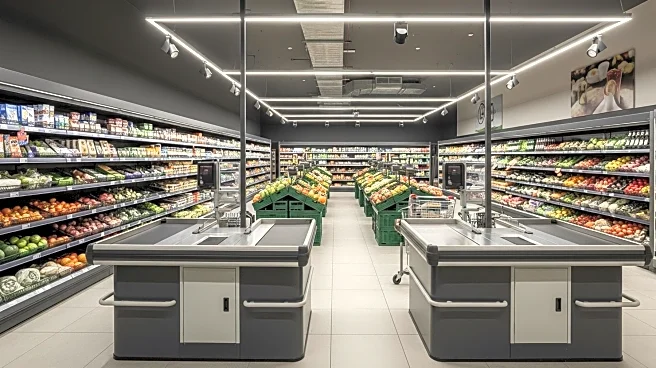What's Happening?
Amazon has announced the closure of four Amazon Fresh grocery stores located in Southern California, specifically in La Habra, La Verne, Mission Viejo, and Whittier. The decision comes as part of Amazon's ongoing evaluation of its store performance, with some locations reportedly performing better than others. Lauren Snyder, an Amazon spokesperson, stated that the company is committed to making grocery shopping more accessible and affordable across its 600 physical stores under the Whole Foods Market and Amazon brands. Despite the closures, customers in these areas can continue to shop for groceries and household items online through Amazon's same-day delivery services, Amazon Fresh, Whole Foods Market, and other grocery partners. The closures follow Amazon's recent announcement of combining its Amazon Fresh and Happy Belly brands into a single grocery essentials collection called Amazon Grocery.
Why It's Important?
The closure of these Amazon Fresh stores highlights the company's strategic shift towards enhancing its online grocery delivery services. This move is significant as it reflects Amazon's focus on optimizing its operations and adapting to changing consumer preferences, which increasingly favor online shopping and delivery convenience. The expansion of Amazon's same-day delivery service to over 1,000 parts of the United States and plans to reach 2,300 cities and towns by the end of 2025 indicate a robust growth strategy in the grocery sector. This development could impact local economies, particularly in areas where physical store closures occur, as it may affect employment and local retail dynamics. However, it also presents opportunities for Amazon to capture a larger share of the online grocery market, potentially benefiting consumers with more efficient and accessible shopping options.
What's Next?
Amazon is working closely with employees affected by the store closures to help them find new positions within the company. As Amazon continues to expand its same-day delivery services, it is likely to focus on enhancing its logistics and distribution capabilities to support the growing demand for online grocery shopping. The company's plans to expand its service to over 2,300 cities and towns by 2025 suggest ongoing investments in infrastructure and technology to facilitate this growth. Additionally, Amazon's integration of its grocery brands into a single collection may lead to streamlined operations and improved customer experience, potentially setting a precedent for other retailers in the industry.
Beyond the Headlines
The closure of Amazon Fresh stores and the shift towards online grocery delivery may have broader implications for the retail industry, particularly in terms of how companies balance physical and digital presence. This trend could influence other retailers to reevaluate their strategies and invest more in digital platforms to meet consumer demands. Furthermore, the consolidation of grocery brands under Amazon Grocery may lead to increased competition among grocery retailers, prompting innovations in product offerings and delivery services. The focus on online shopping also raises questions about the future of brick-and-mortar stores and their role in the evolving retail landscape.









